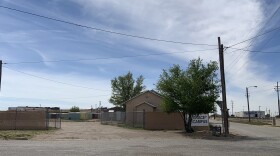There’s been a hefty uptick in demand on agriculture since the outbreak of COVID-19. Which makes laborers getting sick that much more of a threat to large farms. But for the small farms around Lubbock, like Quail Feather Farms, the outbreak poses a different set of risks.
Ashley Myers, the co-owner of Quail Feather Farms, plants a row of onions while we talk on the phone. She runs the farm with her partner and friend Joshua Shankles. “More than ever we see this need to continue to do this because people need food right now and just like everybody else, we have no idea what’s about to happen,” Myers says.
The small farm sits on the outskirts of Lubbock, near Ransom Canyon. Growing food had been a dream of Myers, one that both her parents and Shankles eventually invested in. And prior to the pandemic, the two farmers had finally been able to turn a profit on their business.
Dr. Darren Hudson is a professor and the Larry Combest Endowed Chair at the Agricultural and Applied Economics department at Texas Tech University. His research focuses on food marketing and agricultural policy and trade. He has a few ideas on what could happen.
"So a lot of them, especially those that relied heavily on farmers markets and local restaurants...they're feeling it."
“We often think about agriculture as being sort of this monolithic thing and it’s not,” he says. He explains that niche areas of the agriculture industry, like small farms and farmers markets, don’t exactly fit in government programs geared towards the ag industry. “So a lot of them, especially those that relied heavily on farmers markets and local restaurants that bought their product, they’re feeling [the effects of the pandemic],” he says.
And that’s exactly what happened with Myers and Shankles. In early March, when COVID-19 was making its way to Lubbock, they experienced a sobering moment. As they were planning for their crops, they looked at their board—usually filled with orders—and say it was blank. “That was a really sobering thought to think that our restaurants may never order again,” Myers recalls.
According to Hudson, it’s a difficult process getting money into the hands of small farmers. There’s no system set up to locate these farmers the same way there is for a commercial farmer producing cotton or corn. “The system just doesn’t exist,” he says.
Quail Feather Farms relies on business from clients around town like the Crafthouse Gastropub and La Serena. And on summer weekends you’ll find them perched up at their farmer’s market stand selling salad mixes, bags of broccoli and other produce from their stock. Although, not all business has completely dried up, the uncertainty of everything has them rethinking their strategy. The new strategy includes a lot more technology.
“We have really switched around how we do stuff. We’re delivering. We’re using an app,” Myers says. The two were quick to move to an app called Veggie Vinder, and have started mailing their customers seeds to start their own gardens—all in hopes of getting fresh produce in the hands of all who need them.
“Hopefully everything just kind of mellows out and goes back to normal and we can hug our friends,” Myers says. “But we’re planting like we may not have access to fresh produce in the next couple of months.”




